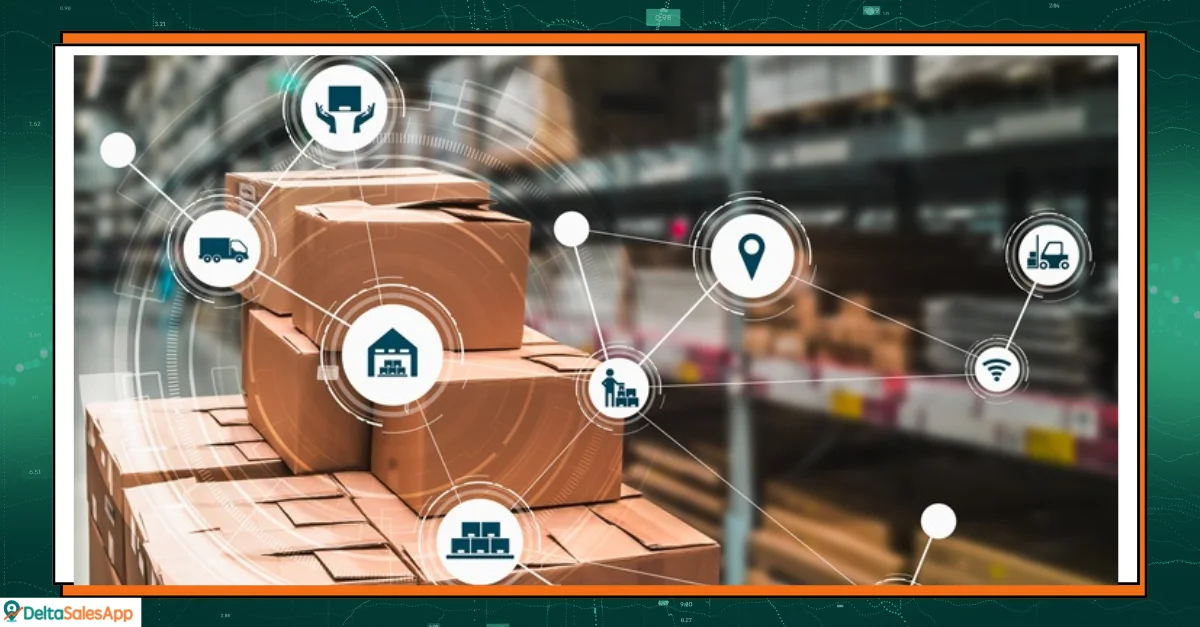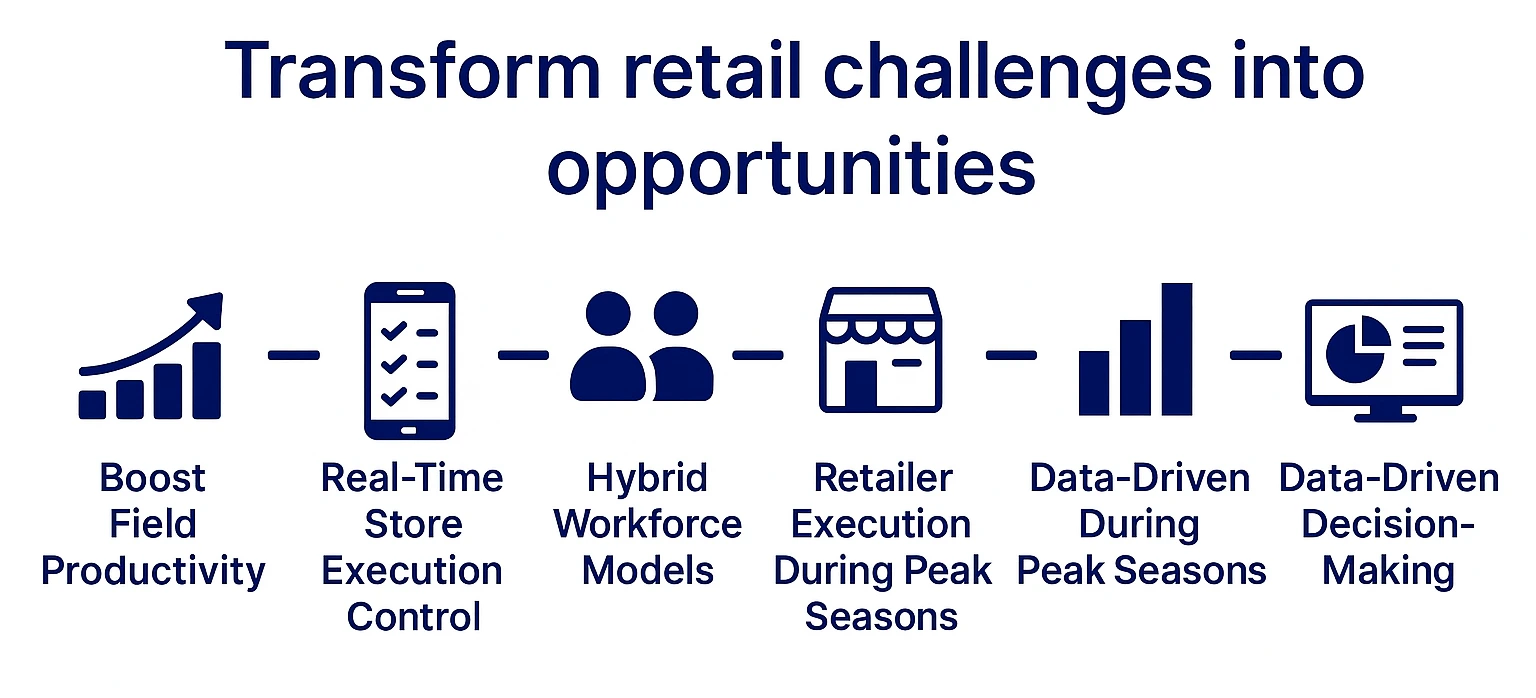Smart Retail Technology for Labor and Supply Chain Solutions

Retail teams and brands are navigating one of the most volatile periods in recent history. As 2025 unfolds, labor shortages, global supply chain issues, and shifting consumer expectations continue to challenge the industry. But amidst these disruptions, smart retail technology is proving to be a key enabler of operational resilience.
From dynamic field force deployment to real-time shelf insights, digital retail execution tools are helping businesses maintain efficiency, even with limited resources. Let’s explore how leading brands are using technology to thrive even in uncertain times.
1️⃣ Boost Field Productivity During Labor Shortages
With field staff stretched thin and turnover at an all-time high, improving productivity per rep is essential. Today’s tech-powered solutions automate repetitive tasks, streamline reporting, and suggest optimal store visit routes using AI.
Features such as intelligent scheduling and performance tracking allow managers to deploy reps where they’ll make the biggest impact. This strategic planning, supported by modern field operations platforms, enables lean teams to cover more ground across both general trade outlets and modern trade chains without compromising quality.
2️⃣ Take Real-Time Control of Store Execution
Even when supply chain delays are out of your hands, you can still influence what happens on the shelf. Mobile-enabled retail tech empowers field reps with live updates, store-specific insights, planogram guides, and performance benchmarks.
This access helps reps act swiftly, spotting empty shelves, correcting displays, and capturing on-shelf availability photos. These real-time actions prevent stockouts and enhance customer experience by ensuring availability and brand visibility at the point of sale.
3️⃣ Adopt Hybrid Workforce Models for Flexibility
The hybrid workforce model—blending internal field reps with third-party merchandising partners is gaining traction. It offers agility without sacrificing consistency, especially during high-volume sales periods.
Retail execution platforms streamline collaboration by consolidating tasks, calendars, and performance data across all teams. When intuitive dashboards and shared goals power hybrid execution, both internal and external reps work in sync, delivering a seamless in-store experience.

4️⃣ Support Retailer Execution During Peak Seasons
Retailers often face staff shortages during holidays and promotional events. This leads to poor display execution, empty shelves, and non-compliant planograms, affecting both brand visibility and sales.
Brands can close these execution gaps with a tech-enabled field force. Tools powered by field force automation ensure that reps receive instant alerts, access past store performance, and act quickly. Whether it’s replenishing inventory or fixing display errors, reps can step in when store teams are overwhelmed.
5️⃣ Let Data Drive Better Decision-Making
Retail technology is not just for execution—it’s also a source of actionable intelligence. Real-time analytics help brands identify performance patterns, regional gaps, and store-level challenges before they escalate.
Field insights can directly inform supply chain decisions, like reallocating stock based on demand signals or adjusting production timelines. Moreover, sales leaders can measure team performance across territories, enabling data-backed decisions that improve ROI and execution quality.
🏁 Conclusion: Turn Retail Challenges into Opportunities
The challenges of 2025 are real—but so are the solutions. Retailers and brands who embrace technology are discovering new ways to remain flexible, insightful, and execution-ready.
By leveraging tools that support real-time insights, hybrid collaboration, and data-driven decisions, companies can transform labor and supply chain issues into growth opportunities. With the right digital foundation, your retail operations won’t just survive disruption—they’ll thrive through it.
🔍 FAQs: Smart Retail Technology for Labor and Supply Chain Challenges
Q1. How does retail technology help during labor shortages?
Retail tech automates tasks like scheduling, reporting, and routing, so a smaller team can achieve more. It ensures the right reps visit the right stores, maximizing field efficiency.
Q2. What is a sales tracking app, and how does it benefit retail execution?
A sales tracking app helps monitor in-store activities, track sales metrics, and provide real-time visibility into field performance. It enables faster decision-making and better execution.
Q3. Can retail technology support third-party and hybrid teams?
Yes. Platforms built for sales team management offer unified dashboards, task coordination, and shared goals, ensuring internal and outsourced teams work cohesively.
Q4. What types of data can retail execution tools provide?
These tools collect data on shelf availability, SKU visibility, display compliance, and visit frequency. They also provide analytics to guide future strategy.
Explore More
👉 Retail Promotion Strategy: Challenges and Smart Execution Tools
👉 Preparing Retail Execution Strategies for the Future
🗣️ What Users Are Saying About Us!
Delta Sales App, trusted by retail businesses for optimizing field productivity and streamlining sales processes, is highly rated on leading review platforms.
Discover how real users benefit from our technology:









